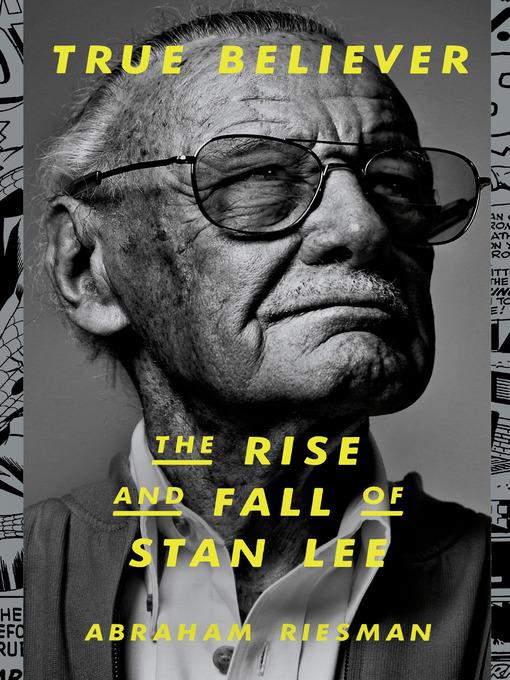
True Believer
The Rise and Fall of Stan Lee
- اطلاعات
- نقد و بررسی
- دیدگاه کاربران
نقد و بررسی

August 15, 2020
A takedown of the comic-book legend, recapitulating well-worn charges about authorship while adding bits and pieces to them. Stan Lee (1922-2018) was something of a con man, writes Riesman, who began this book as a profile for New York magazine that, unsurprisingly, incurred the subject's wrath. He was also easily conned, particularly in his later years, when he was beset by misery--including an allegedly abusive daughter who seemed intent on spending all of Lee's money and hangers-on who bilked him out of millions. Former associates don't come off much better. Of one, writes the author, "He has little to show for his years of labor other than an endless stream of stories, lots of them about how he was wronged by others (a common refrain, for whatever reason, among men Stan grew close to), but many about seemingly every interaction he and Stan ever had." Most fraught--and a tale well known to students of comic-book history--is the question of authorship of such famed superheroes as Spider-Man, with credit going either to Joe Simon or Jack Kirby (and perhaps both) and not to Lee, who claimed it for his own. Long after Kirby's death, Disney, which owned Lee's Marvel brand, settled with the family for millions in a legal battle that almost went to the Supreme Court; other of Lee's enterprises ended up under investigation. Riesman adds that Lee's own creations were less than heroic, as when he pitched actress Whoopi Goldberg a yarn in which she would play "the offspring of an alien father and a human mother who possesses the ability to be sexually irresistible to men." Goldberg didn't take the gig, and she seems an odd choice if we are to accept Riesman's charge that Lee habitually made "racist, homophobic, and misogynist remarks." All idols have feet of clay, but, by this unpleasant account, Lee's were more fragile than most.
COPYRIGHT(2020) Kirkus Reviews, ALL RIGHTS RESERVED.

Starred review from August 24, 2020
Journalist Riesman unpacks the minutiae-gnarled debates swirling around comics writer and producer Stan Lee (1922–2018) in his eventful, myth-dispelling debut, while also telling a story that will resonate even for those who don’t know Spider-man from the Red Skull. With the caveat that reports of Lee are “where objective truth goes to die,” Riesman does his best to separate fact from hype. Lee, raised by Jewish immigrants in New York City, grew into a hustler and tall-tale-teller, and Riesman breaks down Lee’s life into three epochs. Pre-1961, he ground out stories for his cousin-in-law’s publishing company. In the 1960s he helped launch the series (Fantastic Four, Spider-man, X-Men) that redefined the comics genre. Lee became Marvel publisher in 1972, and Riesman characterizes him as perfecting the chipper “Stan Lee character” displayed in his “Stan’s Soapbox” column, where “he’d pontificate and rile up his base with slogans and jittery word-jazz.” Riesman delves into controversies about whether Lee—who never missed an opportunity to slap his name on a product—took credit from artists like Steve Ditko and Jack Kirby. Later chapters detail Lee’s unhappy Hollywood sojourn, marked by subpar output, horrific family dysfunction, and scandals (two of Lee’s companies collapsed in potential criminality). This detailed, clear-eyed examination pulls back the curtain on one of America’s great storytellers and is sure to reignite debates over Lee’s legacy. Agent: Ross Harris, SK Agency

December 1, 2020
Journalist Riesman details the life of Marvel Comics legend Stan Lee (1922-2018). Born Stanley Lieber to Jewish immigrants, Lee became editor of Timely Comics at the age of 18. He rose to fame in the 1960s with the creation of Spider-Man, the Fantastic Four, and the Avengers. Riesman, however, casts doubt on these characters' origins, giving primary credit to Jack Kirby, Steve Ditko, and other artists. Despite his success, Lee remained indifferent and embarrassed by his comics work, attempting to escape the industry for other publishing and film opportunities. After leaving Marvel, Lee presented a public-facing caricature of himself in movies and at comic cons. In reality, his life had become turbulent. Riesman explains how Stan Lee Media and POW! Entertainment were questionable business ventures with a history of fraud and mismanagement. He also tells how, following his wife's death in 2016, Lee's daughter and others controlled his money and brand, while Lee experience-der abuse and depression. VERDICT Covering similar ground as 2019's A Marvelous Life, this work by Riesman provides additional insight into Lee's family dynamic and details about Lee's business associates. For comics and Stan Lee fans looking for a critical take on this cultural icon.--Chris Wilkes, Tazewell Cty. P.L., VA
Copyright 2020 Library Journal, LLC Used with permission.




دیدگاه کاربران